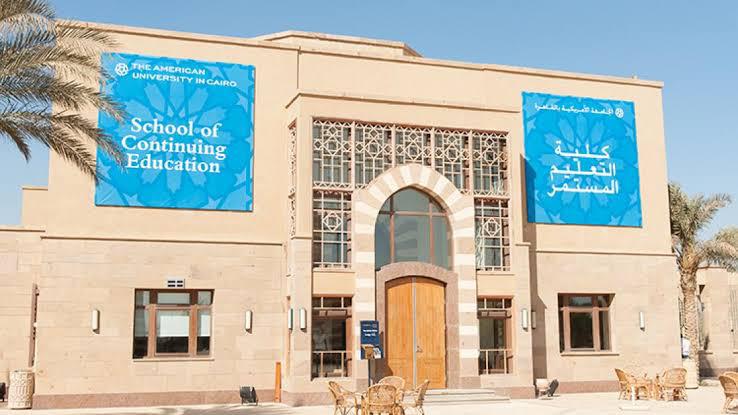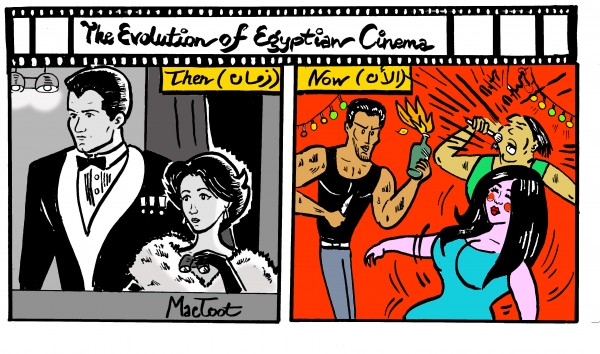SCE: The Pandemic Year, Book Clubs, and More
By: Vereena Bishoy Boules
@vereena_bishoy
Photo Courtesy of The American University in Cairo
This fall marks the School of Continuing Education (SCE) Dean James Ketterer’s two-year anniversary at AUC. The Caravan sat down with Ketterer to discuss how the SCE dealt with the pandemic, how the AUC community can get involved with SCE, and the Dean’s book club.
Below are some excerpts from the interview.
The Caravan: To start off, some may be unfamiliar with SCE, so could you briefly introduce it and the work that it does?
Ketterer: Yes, and I do think that maybe a fair number of people are not as familiar with the School of Continuing Education as they could be, as they should be, and as I would like them to be. It is part and parcel of AUC, it has been for almost the entire history of AUC. So AUC is 101 years old now, and SCE has existed in various forms since 1924. So for almost the entire span of AUC’s history. There has been this function, which is to reach out to the broad swath of Egyptian society and beyond and offer high-quality educational offerings to a wide variety of different audiences, who want to take these classes, and programs and certificates and diplomas for many, many different reasons.
So, we have career development classes; we have English language classes; we have classes that are specialized for government ministries; we have classes that we do in support of the US Embassy that we offer to high school students. We can get into the details on all of these, but, many, many different sorts of offerings, lifelong learning is something that we’re adding on more recently, that we’ve had it in different forums in the past. So kind of, if you name it, we probably teach it, we probably do it and if we don’t, then we would listen hard and do it.
It is essential to shed light on such a rich school at AUC. An important thing one needs to address is how online modality affected SCE because soon after you joined, it was the start of the pandemic, so how would you say SCE adapted to continue serving the broad range of students it attracts?
Well, before the pandemic hit, we had some offerings and some blended learning classes. We had a certificate program. But quite honestly, it wasn’t that many classes, and they were still in the process of being revised and tweaked so that they would improve with each time that they were offered. But then, of course, March 2020 came, and we weren’t able to offer any face-to-face classes. So then, it was all under the heading of “necessity is the mother of invention.” So we were required to then figure out a way to continue to accomplish our mission of offering classes to those who need and want to take them, and online was the only way to do that in a safe way.
There were real challenges that had to be addressed as there were across the globe. So a year plus later, I’m happy to say that we have a strong cohort of instructors, and we have students who are not only taking one class but returning to do more and more. But I think that’s just the beginning.
When we go back to face-to-face instruction, we won’t scale back on the online offerings. We’ve always made it a point to be as accessible as we can. It’s a key part of our mission. We have classes in Tahrir; in the old campus, we have classes in new Cairo, we offer classes and various other locations around Egypt in the governorates. But that can only reach so many, and so what we can do online is really tremendous. So far, we’ve had students find us from places like Singapore, Canada, and other places in Europe. We’re beginning to kind of really ramp up our message and our marketing. So those students know that we’re there and what we offer, and I’m convinced we’re going to find more and more.
We also need to kind of up our game in what we offer and how we offer it. The world of digital education changes so quickly, and I think we need to expand virtual reality into the gamification of courses. For instance, one course we’re working on, for instance, that I’m very excited about is capturing the excitement of Cairo’s city, both its history and its current cosmopolitan status. Through a series of short courses, or short presentations, that the brilliant Dr. John Swanson is designing, we would give this view of the city of Cairo to people around the world. And we would hope that some of those would take this class and then be so intrigued that they would want to come to visit Cairo, and then we would have a follow-on in-person class. So I think this combination of reaching people gives them a sense of what Cairo is, maybe breaking down the stereotypes and cutting through the misinformation. One of my favorite things is just the modern-day City of Cairo; it’s an amazing place day in and day out; it’s never a dull place. How do we capture that digitally in a way that’s exciting, that goes beyond the kind of traditional way of offering online offerings? So, using people who are great videographers using the resources of the AUC library that has these tremendous archives and using the brilliant expertise of somebody like Dr. Swanson, I’m excited about these opportunities. I think we can not only get more students for SCE but represent AUC and represent Egypt in a really positive way.
Another thing that’s very important to discuss is how undergraduate and graduate students at AUC can get involved with SCE?
I am so glad you asked that. So that’s something that we very much want to do, and that we are going to find ways to do that. One of the things we’re working on, as an example, is The Language Buddy Program… As we start to get people from around the world, when they can finally come and be in person for those classes, I would like to set up a program where AUC undergraduates and graduate students could come and spend some time with those international students and be language buddies. I would love to have international undergraduate students come to AUC from anywhere in the world and spend some time with our Egyptian high school students, who would love to learn English from these young undergraduates. Particularly, if they come, maybe I’m biased, but if they come from the United States. The Egyptian high school students want to learn American slang from these students, and they’re much more interested in learning that from them than from somebody of my advanced age. I think that could be very exciting.
I wanted to ask about the book club you’ve initiated; where did the idea initially come from?
The idea initially came from two things. One is that, in my previous job at Bard College, every semester, I was actively involved in teaching, and I enjoyed it very much. When I came to the AUC, I was spending my time climbing a very steep learning curve to get to know the job as dean of SCE and didn’t really have an opportunity to interact with students in the classroom. I thought, well, one thing I could do that another thing that I was missing was just reading books, and sort of getting out of my own comfort zone and reading books. And I used to be a member of a book club in New York, and I thought, well, what if I combined these two things and offered a book club experience to people in Egypt, but also offered it to me.
It’s not a course; we’re all equal members in the club, I included. We did it for four months, and we had well over 100 applications for the first club; I think we ended up with eight or nine people. We had these other perspectives, which I think is really interesting. I’ve enjoyed it. I think the other people have enjoyed it. We meet once a month, and we talk about the book that we’ve read. It’s just that straightforward. There are no grades, and there’s no final report. All you have to do is read the book and be willing to come and talk about it, and we’ve had some really, really, really fascinating conversations.
What have you learned so far from your experience as the Dean of SCE?
The first, I think, is that we have a tremendously dedicated and resilient staff and a group of instructors and learners, and I see that when we look back to the spring of 2020. As people kind of recovered from the initial shock of this news, and then getting beyond the idea that this was just going to be going on for a couple of weeks or maybe a month or something that this was a long-term issue. People really have risen to the challenge and done it in a way with great energy, great collegiality, and great creativity. So it’s just been tremendous to work with people like that, which is true across the University. The students in all the schools of AUC and the leadership and faculty and staff at AUC, it’s really, it’s been a tremendous thing to see how people have responded and risen to this challenge, so that’s one thing.
The other thing is that we’ve spent some time learning about the things just operationally at SCE that we could do better. I’ve realized it’s been overly complicated to register for one of our classes, as an example. We pride ourselves on being accessible, but we need to make sure we’re also electronically accessible and that people can register for one of our classes just as easily as they would do other things online in their lives. I joke, but it’s not really a joke that I want it to be as easy to register for one of our classes as it would be to order takeout pizza or getting an Uber. We’re not quite there yet, but we’re getting there, and we have really smart colleagues that we’re working with who are helping us do that.
What will always be unique about SCE?
I think what’s unique is that we are so flexible, and we can really respond to what’s happening at the moment, and we can find ways to meet people where they are intellectually and also physically, and also now digitally. We can reach out to people, and who never would have imagined that they might be taking courses with AUC, who might have seen AUC as sort of some sort of distant institution, behind the walls, and we’re there to bridge those walls, we’re there to reach out to people, and to offer them something that’s helpful to them, but also challenges them. I think that that has been the driving force of SCE since it existed in 1924 and will continue to be, no matter how many kinds of new digital versions of what we come up with no matter how far we reach beyond the borders of Egypt. That mission is at the core of who we are and what we do.



